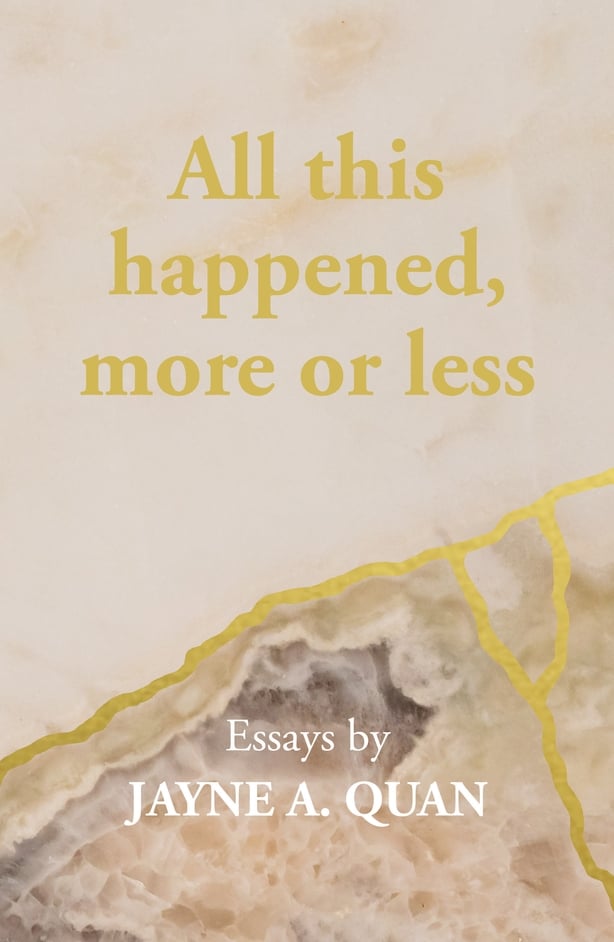We present an extract from All this happened, more or less, the new essay collection by Jayne A. Quan, published by Skein Press.
Jayne A. Quan writes with honesty and humour about key moments in their life and transition. With lyric insight and quiet clarity, Quan navigates the intersection of loss, grief, memory and the power of love and healing through the lens of a body in motion.
My father wakes me up sometime on the morning of 9 April. I think he sounded calm, but even now I'm not sure. What does my father sound like when he is nervous? Have I ever heard him panic?
'We have to go to the hospital,’ he says.
I don’t remember looking at him. I don’t remember his face as he says these words to me.
‘I’ll have my phone. Watch the kids.’
He leaves and I go back to sleep. Or at least I must have, because the next memory I have is daylight streaming through the windows with no notification on my cell phone that my parents have tried to reach us.
My grandfather picks us up from the house. Or maybe it’s my grandmother. Someone takes us into the city where the hospital is, where something has happened. One of the hospital corridors is wide and sand-coloured. Everything from the wall to the carpet to the linoleum floor is light brown and earthy. Someone who knew my mother from high school is here and says I look just like her. Or maybe that memory happened during a different visit to the hospital.
We are quiet, the four of us children. We are well-behaved and pleasant to be around. Nobody tells us anything except that something bad has happened. My memory skips along scenes like a stone across a lake. People in a room. My grandfather’s annoying girlfriend. My stepmother’s brother who doesn’t talk to us anymore. His wife who is the reason he doesn’t talk to us anymore. The sheets stacked in a cupboard I wasn’t supposed to open. My stepmother in the hospital bed with that downcast look on her face, a look that I know now is fear and grief, but back then was incomprehensible. The sterile, almost acrid smell of disinfectant. I can’t remember a single doctor.
And then, suddenly, standing at the neonatal incubator.
The room is warm and dimly lit. It’s quiet in the way that libraries are quiet, as if there is another world you’ve stolen away from just outside the door. Tungsten lamps are somewhere in the room, throwing yellow and marigold across every reflective surface. There’s a lump in my throat and I’m holding back tears because this is not the way that life is supposed to be brought into the world. But it is. It was.
They didn’t have names at first.
That’s another scene from my disjointed memories of our time in the hospital. I’m sitting in a bookstore across the street, flipping through baby names. We had certain criteria. Baby A and Baby B needed names that started with the letter k and also had a y. These were realistic goals for us at sixteen, thirteen and ten years old. Our two-year-old brother was too small to come with us, so it was just us three flipping through book after book, trying to kill time. I watched people walk into and out of the hospital through a grimy window in the bookstore.
But as I stood at the incubator, they did not yet have their names.
Baby A is 1 lb 4 oz. Baby B is 1 lb 5 oz. At twenty-two weeks, they were supposed to be almost the size of eggplants. Because they are twins, they are not quite that size, but they match the hue – violet with tones of yellow; the emergency C-section meant they had to be removed from the birth canal. Unready to be born; things bruise easily when plucked before their time.
In that quiet room where too-small babies are kept to prolong their existence, I stare at the purple skin of my Baby A brother. I stare at the smallness of him, how he can fit into my hand. I imagine the size of the hole that he would leave inside of me if he were to go.
I think I will remember this forever.
And I do. I will.
–
Baby A passed away on 23 April 2007. He was two weeks old.
This is how my memory of him works: I loved him wholly and I am, to this day, devastated by his loss. I know more about every person I’ve had a passing conversation with than I do about my youngest brother. And yet I know that I loved him.
The hole his death left in me was immense and only seemed to grow as time went on.
When large stars die, they explode into supernovas, expanding from their centres in light and colour. When large-enough stars die, those supernovas collapse and form a singularity – a point where nothing can escape: a black hole.
Let me tell you how a black hole is formed inside of a person. Let me show you.
Let me start at the end.

All this happened, more or less is published by Skein Press.

